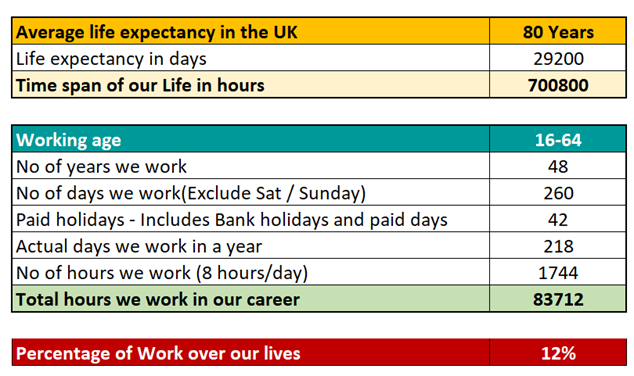Setting Realistic Expectations: How Realistic Can You Get?

By Ram Raghavan M.S, MBA, PhD, FIETE, FFISP
In my previous article, I discussed the strategies sales leaders can look at to enhance the work-life balance of their sales teams. I should have said it is life-work balance as we work to have a comfortable life. I did some analysis about the average life expectancy and time we spend at work. I used the statistics from ONS and created this small graphic. It turns out that, in reality, we spend only 12% of our entire life working.

I have not considered days lost due to absenteeism, sickness, or not being engaged in this calculation. It really brings home the truth that we should be focusing on LIFE-WORK balance and not the other way around. If there is anything apparent, it is that we need to set realistic life-work expectations for self-perspective and for the sales teams that leaders lead.
In this article, I will be suggesting a few things leaders can do to establish realistic work expectations as it is crucial for their success and overall performance:
- Clearly define goals and targets:
It appears simple, and many think they can do it. In reality, there is generally a wide gap between what the leaders think they have communicated and what the team have understood. Everyone talks about SMART objectives but it means nothing if leaders cannot ensure that the team have actually understood what it really means. It is not just about goal setting but helping the team understand the purpose of the goal, how it impacts the vision and more importantly getting the team to understand the value they can add or erode as a result. This clarity helps salespeople understand what is expected of them and enables them to focus their efforts effectively.
- Involve the team in goal setting:
It is important to involve the sales team in the goal-setting process whenever possible. Encourage their input and suggestions to foster a sense of ownership and commitment to the goals. This collaborative approach ensures that expectations are realistic and achievable from the team's perspective.
- Provide comprehensive training and resources:
There is no point in having a Ferrari with a Kia engine. To ensure that they succeed, you need to turbocharge them by providing them with all the knowledge, skills, and resources to meet their targets. It is important to go beyond traditional sales training and provide an environment for them to apply what they have learnt.
- Conduct regular performance assessments:
Whilst a majority want to do this, time (or the lack of it) prevents them from having those conversations. Having informal chats will certainly help you get the pulse of the situation. You can use that insight to then schedule regular conversations with people that need it the most. It is important to ensure that salespeople understand the gaps in their ability and the steps or milestones they need to achieve to bridge that gap. Use objective, data-driven, quantitative and qualitative measures to provide constructive feedback to help the individual take control.
- Foster open communication:
Encourage open and honest communication within the sales team. Create a supportive environment where team members feel comfortable discussing challenges, seeking guidance, and sharing ideas. Regularly check in with individuals to understand their progress, address any concerns, and provide support when needed.
- Consider market conditions and challenges:
A lot of conversation happens around targets and quotas. Regularly use these conversations to discuss the impact of market conditions and external factors on sales performance. Try to get your team to gather information about how competitors are managing the situation. It will help set realistic expectations that account for industry trends, competitive landscape, economic fluctuations, and other relevant factors. Adjust goals and targets as necessary to reflect the current business environment, ensuring they remain attainable and aligned with the team's capabilities. Remember stretch goals are good to have but everybody has an elastic limit and can snap when stretched beyond what is realistic. Be mindful of that.
- Promote life-work balance:
Sales can be a demanding and high-pressure field. Encourage a healthy life-work balance among your sales team by setting realistic expectations for their working hours, travel commitments, and overall workload. Recognise and support their personal well-being, which can ultimately contribute to long-term success and productivity.
- Provide ongoing support beyond professional development:
To engage at work, we have to disengage from life problems. As a leader, have informal conversations to understand your team’s challenges outside work. Provide coaching, mentoring, and training to help sales team members improve their skills and overcome obstacles beyond work. This demonstrates that you are committed to their success and motivate them to achieve their goals.
Remember, setting realistic work expectations involves finding the right balance between challenging targets and achievable outcomes. By following these steps, leaders can promote a positive and productive work environment that empowers their sales teams to thrive…
About the author
Dr Ram Raghavan MBA, PhD, F.APS is the Founder of the Kaya Wellbeing Index, which was founded as an inspiration from his academic research at Manchester Business School into how people value each other at a conscious and subconscious level. The index was further developed following extensive research with business leaders, consultant neurologists and psychologists.
Ram started his career in India as an R&D engineer before moving into sales and service and managing a biomedical instrumentation business for a Japanese firm for the Indian subcontinent and UAE. Ram then came to the UK and completed his MBA specialising in business strategy.
Ram is curious by nature and can spot patterns between seemingly unconnected things. He is the author of three books, one on customer service and two on employees. In his spare time, he designs and creates systems to automate his home, reads and meditates. He also runs a charity in India and provides scholarships to children.


